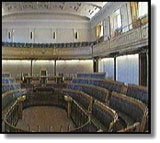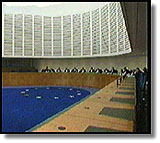
|
Subject to two referendums, there is to be a parliament for Scotland and an assembly for Wales. There will also be a Bill of Rights for the United Kingdom. The BBC’s Constitutional Affairs Correspondent, Joshua Rozenberg, considers what these changes would mean.
Devolution
July 1997: White Papers on the proposals are published, first for Wales then two days later for Scotland. The referendums themselves will take place in the opposite order - on September 11 in Scotland and September 18 in Wales. This leaves seven weeks for campaigning in Scotland between the publication of the White Paper and the referendum and a little over eight weeks in Wales. The Edinburgh parliament would be able to make laws for Scotland in areas such as education, criminal justice and health. However, the Westminster parliament would remain responsible for Scottish defence, foreign affairs, immigration, social security and broad economic policy. The Welsh assembly would become responsible for major public services in Wales, with the exception of social security and law and order. It would have powers to reform Welsh quangos and it would inherit the powers of the Secretary of State for Wales to make secondary legislation.
Legislation is required before the referendums can be held. The Referendums (Scotland and Wales) Bill was published on May 15 and passed all its Commons stages by June 4. The Government hopes it will become law by July. It says the referendums will be open to everyone entitled to vote at local elections in Scotland and Wales. That includes members of the House of Lords (123 of them live in Scotland) as well as citizens of other European countries resident in Scotland or Wales.
A claimant who lost would still be able to go on to Strasbourg. However, the Government will not be able to appeal against a defeat in the United Kingdom courts. Governments do not have human rights. The previous government opposed these moves because it feared that judges would be forced to make political decisions. Much depends on how the legislation is worded. The government is thought to support a fairly weak form of incorporation, along the lines of the New Zealand Bill of Rights. The courts would be told that as far as possible they should interpret the law in a way that was consistent with the human rights convention. However, parliament would still be able to pass a law which was inconsistent with the convention if it said so explicitly. This means parliamentary sovereignty would be preserved. |
Diana, Princess of Wales, 1961-1997
Conference 97
Devolution
The Archive
News |
Issues |
Background |
Parties |
Analysis |
TV/Radio/Web
Interactive |
Forum |
Live |
About This Site
News |
Issues |
Background |
Parties |
Analysis |
TV/Radio/Web
Interactive |
Forum |
Live |
About This Site
© BBC 1997 |
politics97@bbc.co.uk |



